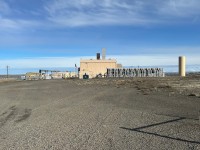GTN Xpress legal challenges!
Important Update on GTN Xpress Legal Challenges
The States of Oregon and Washington recently filed a petition in the federal D.C. Circuit Court of Appeals challenging GTN Xpress! The states’ petition offers a blunt take on the stakes of the GTN Xpress proposal:
The construction and operation of the expansion project will increase air pollution, harm wildlife owned by the States of Washington and Oregon, and increase safety hazards to state-owned property near the pipeline. The expansion project will also increase greenhouse gas emissions in Washington and Oregon, which will exacerbate climate change harms to state-owned coastal land, forests, parks, and other property. These injuries also harm State residents, whom the States represent…A favorable decision from this Court would prevent or mitigate the harms that this project will cause to the States and their citizens.
The states’ challenge follows the challenge already filed by Columbia Riverkeeper and Rogue Climate, also in the D.C. Circuit Court of Appeals. We applaud the states of Oregon and Washington for standing up to FERC, and most of all we applaud the thousands of people across the region who have made these appeals possible by pushing back against TC Energy’s proposed major fracked gas expansion.
Situation on the ground
The effort to hold the line against the major fracked gas expansion continues, and the impact is evident on the ground in Central Oregon. Below is a picture of the Kent fracked gas compressor station in February 2024. TC Energy proposes to expand this facility for its GTN Xpress project. With GTN Xpress, TC Energy would increase shipments of fracked gas through Idaho, Washington, and Oregon by pushing more fracked gas through an existing, decades-old pipeline system.

This image below is the same compressor station, photographed in January 2023.
Do you notice any big changes? No? Neither do I. Although the Federal Energy Regulatory Commission (FERC) approved TC Energy’s plans, the compressor has not yet expanded.
How did we get to this point in the effort to stop GTN Xpress?
We got here through community organizing, creative actions, and over a year of mounting resistance. Working together and coordinating through a broad coalition, and joined by powerful allies like Senator Jeff Merkley and the states of Oregon, Washington, and California, the effort to stop GTN Xpress has pulled together opposition to a fracked gas expansion that could have easily flown under the radar.
Communities across the Northwest, organizers throughout the region, elected officials, youth climate justice activists, health professionals, faith leaders, Tribal members, the Columbia River Inter-Tribal Fish Commission, the states of Oregon, Washington, and California, allies across North America, pipeline safety experts, frontline leaders, and thousands of individuals raised their voices to object to TC Energy’s reckless plan.
- Amplifying voices. One year ago, on a stormy night in Central Oregon in February 2023, organizations came together to host a “People’s Hearing” about GTN Xpress. The FERC did not hold a hearing about GTN Xpress, and so we held our own. Hundreds of people participated in person and online, and the message began to spread: the Northwest neither needs nor wants TC Energy’s latest attempt to push more fossil fuels into our communities.
We collected the testimony from the meeting and submitted it to FERC, offering them the feedback they should have earnestly sought, but instead chose to ignore.
- Raising awareness. Throughout 2023, organizers from local groups in communities across the Northwest, from Idaho to Central and Southern Oregon, to Seattle and the I-5 Corridor, to the Warm Springs area, held rallies, walks, vigils, comment-writing workshops, email campaigns, phone banks, national op-eds, and other actions. Through their efforts, the list of elected officials and governments opposing GTN Xpress grew significantly. Opposition now includes nine members of Congress, state legislators, three attorneys general, and two governors.
Through these efforts, GTN Xpress began to make national and international headlines.
- Drawing attention to mounting evidence about the dangers of GTN Xpress. In July 2023, TC Energy’s Columbia Gas Transmission pipeline near Strasburg, Virginia, ruptured, caught fire, and ejected approximately 250 feet of buried, high-pressure fracked gas pipeline out of the ground. The massive fire caused the closure of a nearby interstate highway. The event prompted over 20 organizations to immediately demand that FERC delay its decision on GTN Xpress until the agency had a full understanding of the Strasburg incident. FERC did delay its decision. However, to this day, FERC has not answered specific questions about GTN’s pipeline system integrity or the implications of TC Energy’s fiery Strasburg explosion for the GTN system, which is similarly decades old.

Banners depicting fossil fuel safety risks
outside FERC office in Portland in July 2023. - Challenging an intransigent agency. In October 2023, FERC approved the GTN Xpress proposal. Within weeks, Columbia Riverkeeper, Rogue Climate, and the states of Washington, Oregon and California filed petitions for rehearing. Now, many of these parties are arguing in federal court that FERC’s decision was legally flawed. Columbia Riverkeeper is represented by Earthjustice, Crag Law Center, and Columbia Riverkeeper staff attorney Audrey Leonard.
In January 2024, 149 organizations signed a letter urging the U.S. EPA to refer FERC’s decision to the Biden Administration’s Council on Environmental Quality (CEQ). The groups pointed to FERC’s refusal to resolve major concerns raised by EPA.
- Questioning the project’s future. TC Energy wants to push more fracked gas—150 million cubic feet of it—into the Northwest. Yet, the states of Oregon and Washington have rules on the books that require gas customers and utilities to diminish gas use over time to meet their goals for reducing climate-changing pollution.In testimony to the Washington Utilities and Transportation Commission and FERC, pipeline opponents raised concerns about the impacts of overbuilding fracked gas pipeline capacity on ratepayers who would get stuck with the bill.
In response, the Washington Utilities and Transportation Commission (WUTC) declined to acknowledge Cascade’s 2023 Integrated Resource Plan (IRP). The WUTC sent a “disacknowledgment letter” to Cascade, noting the “serious nature of the Commission's concerns with this IRP.” Cascade had argued in the IRP that GTN Xpress was needed. After hundreds of people in Washington urged the WUTC to take a closer look, the WUTC found major gaps in the gas industry’s claims.
- Challenging TC Energy at every step. With thousands of comments, multiple letters signed by dozens of organizations, expert testimony, and legal filings, the coalition continued to argue that GTN Xpress was a flawed project. FERC chose to adopt TC Energy’s own conclusions instead, downplaying the impact of over 3.47 million tons of carbon pollution each year, the foreseeable impact of the GTN Xpress project. That’s over 740,000 cars worth of pollution. Today, court challenges are taking on FERC’s flawed decision and asking the courts to restore sanity to FERC’s rubberstamp process.
- Sticking together. We are deeply grateful to many coalition partners who continue this work and who organize every week in our region. Each played a key role at different times drawing attention to GTN Xpress’ climate, safety, and environmental justice implications. Coalition members and allies have included, Rogue Climate, Columbia Riverkeeper, Wild Idaho Rising Tide (WIRT), 350PDX, 350 Deschutes, 350 Eugene, Oregon Physicians for Social Responsibility, Breach Collective, Extinction Rebellion, Sierra Club, Washington Physicians for Social Responsibility, Oregon Interfaith Power and Light (OIPL), California Interfaith Power and Light (CIPL), 350 Corvallis, 350 Salem, Ecumenical Ministries of Oregon, Earth Ministry/Washington Interfaith Power and Light (WAIPL), 350 Seattle, Waterkeeper Alliance, Consolidated Oregon Indivisible Network (COIN), Portland Youth Climate Strike, Veterans for Peace Spokane, Central Oregon Black Leaders Assembly, and many others! THANK YOU!!!!
What comes next?
In 2024, as legal challenges make their way through courts, TC Energy may seek to begin construction on its fracked gas expansion project, even before the arguments are resolved. People near the GTN pipeline system are questioning whether TC Energy can be trusted to operate safely in dry, fire-prone areas that have seen other recent fires. For instance, if a pipeline rupture and fire similar to what happened in Strasburg, VA, occurred in Central Oregon, the results could be catastrophic.
In the coming months, we will continue the effort to stop TC Energy from completing GTN Xpress, and we celebrate the community leaders all along the GTN Xpress corridor who continue to raise awareness through creative organizing.


